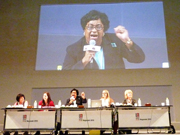News
Women union leaders in Japan to discuss future of women in workforce

About five hundred women trade union leaders from around the world came together in Nagasaki, Japan, this weekend at the UNI Global Union World Women’s Conference to demand that multinationals create good jobs and decent work for women workers and end the race to the bottom for all workers as they cut staff and attack union rights.
The conference participants, who represent 182 unions from 66 countries, also demanded governments around the world focus on creating jobs and protecting the rights of women workers. Women have been hit hard by the economic crisis and UNI is appealing to the G20 to tackle the issue.
The focus was on the host country Japan, as well, with a speech by Eriko Fukuda, a member of the Lower House of the Japanese Parliament from the Democratic Party of Japan who represents Nagasaki.
At the UNI Women’s Conference, which took place on Saturday and Sunday, the trade union leaders showed strong support for UNI’s new strategic plan called “Breaking Through”, which aims to build membership in UNI unions around the world. They said they would focus on supporting union organising and pressing for workers’ rights at multinationals, especially those that employ heavily female workforces.
“More than half of all women in the world are in the global workforce but the only time they are given priority seems to be when companies are cutting back, which we have clearly seen in the current global financial crisis,” said Denise McGuire, president of UNI Women and deputy vice president of UK union Prospect. “Trade unions are fighting for a fairer share for women who do the majority of the work in the world. We are ensuring that women in trade unions are leading that fight.”
The UNI Women’s Conference was held just ahead of the UNI World Congress, which starts on November 9 in Nagasaki, to focus on the particular issues facing women in the global labour market. With Nagasaki, known as the city of peace and a leader in the fight for abolition of nuclear weapons, the women made a special appeal for world peace and an end for the use of women as weapons of war.
Along with discussing strategies to combat the lower pay, lack of paid maternity leave and mistreatment of women workers, conference attendees talked about the successes they have had around the world.
For example, shop workers employed by IKEA in Australia were just able to negotiate 26 paid weeks of parental leave through their union the SDA; cleaners in the Netherlands, many of whom are Muslim migrant women, just concluded a 9 week strike in order to win a living wage; and cleaners in Houston, Texas, almost all of them Mexican women, had no health insurance until they successfully won their right to a union with UNI’s help.
UNI General Secretary Philip Jennings said at the conference that the services and allied industries are the sectors of the future: they already employ the majority of the workers around the world and they have a heavily female workforce. For that reason, it is imperative that UNI support women workers and women union leaders.
“No organizing plan will work unless we are appealing to, convincing and having organizations that understand the concerns of women,” he said. “There will be no decent work, no jobs with justice, unless we have plans to fight pay discrimination. The global pay gap is 22 percent. It’s rotten. Let’s end it.”
The UNI women’s conference passed a resolution supporting a plan to ensure women make up at least 40 percent of all UNI leadership structures.
Japanese MP Fukuda spoke to the conference about the need for more young people and women to get involved in politics. She said when she announced her candidacy many people said, “What can a young person do? What can a woman do?”
“Too few young people and too few women are involved in politics,” Fukuda said. “We’ve been excluded up to now and it’s all the more reason a young person like myself should be involved in politics. Politics has fallen behind the curve.”
Fukuda said that compared to other countries in the world, the status of women in Japan is low in society. She called on conference participants to “leverage their power to try to bring about a change in society.”
Fukuda, 30, rose to prominence in Japan as part of a group of plaintiffs in a suit against the Japanese government over the use of a blood clotting drug that gave patients Hepatitis C. Fukuda contracted the disease after being give the tainted drug as a baby.
For more information on the UNI Women’s Conference and the UNI World Congress, you can check out the UNI World Congress blog at: http://www.uniglobalunion.org/Blogs/Nagasaki.nsf/ or follow us on Twitter @UNIGlobalUnion or on Facebook at UNI Global Union.

